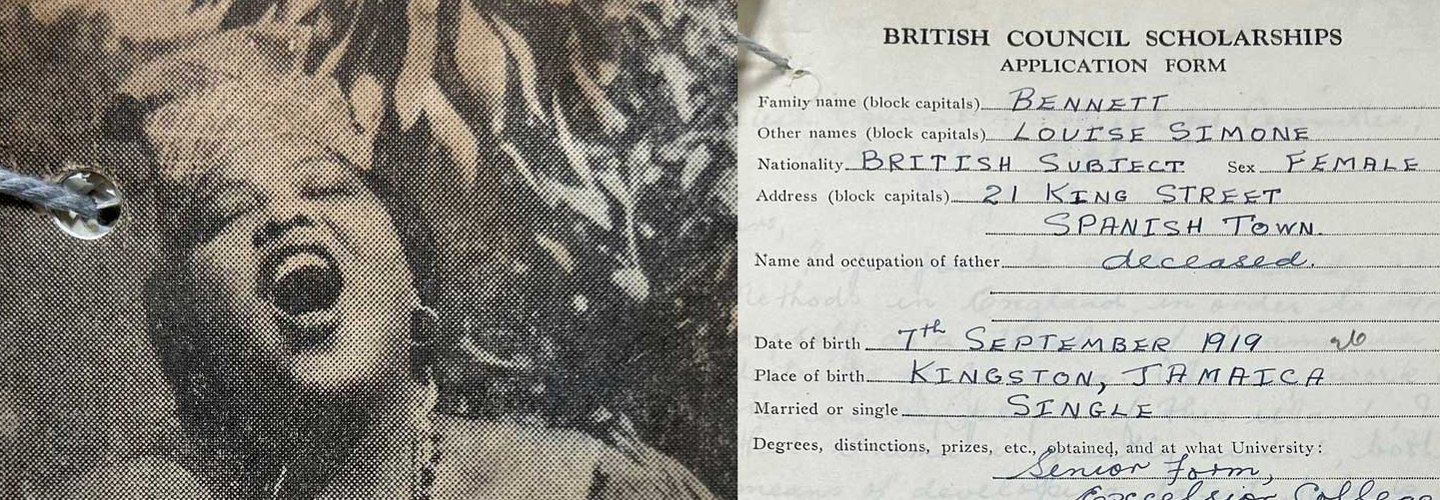Early years
Louise Bennett was born in Kingston, Jamaica in 1919. Her father, Augustus Cornelius Bennett, owned a bakery, and her mother, Kerene Robinson, worked as a dressmaker. After the death of her father in 1926, Louise was largely raised by her mother.
She went on to study Jamaican folklore at Friends College in Highgate, St Mary, and her poetry was first published in the Sunday Gleaner (Jamaica’s national newspaper) in 1943.
Applying to the British Council
In 1945, Louise won a British Council scholarship to study at the Royal Academy of Dramatic Art (RADA) in London. The National Archives holds a range of records related to Louise’s application and time at RADA. These offer an insight into her studies, aspirations and artistic craft. Many of these records are written by Louise herself, showing how rich personal stories exist within official government records.
British Council Scholarship records, held in the BW 84 series, contain hundreds of personal files which can help to tell the stories of a range of overseas students. Louise’s application form contains a wealth of information about her education, publications, current occupation, and her future profession.
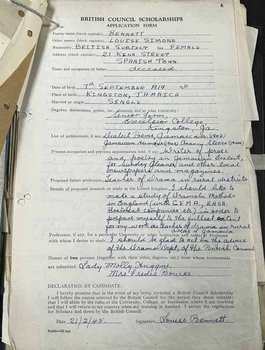
Partial transcript
Degrees, distinctions, prizes, etc., obtained, and at what university:
Senior Form, Excelsior College, Kingston, Ja.
List of publications, if any:
Dialect Poems, Jamaica. (1942), Jamaican Humour (1943), Anancy Stories (1944)
Present occupation and previous appointments held, if any:
Writer of prose and poetry in Jamaican Dialect, for Sunday Gleaner and other local newspapers and magazines.
Proposed future profession:
Teacher of Drama in rural districts
Details of proposed research or study in the United Kingdom:
I should like to make a study of Dramatic Methods in England (with CEMA., ENSA. theatrical companies etc) in order to prepare myself to the fullest extent for my work as a teacher of drama in rural areas of Jamaica.
Preference, if any, for a particular University or other institution and name of Professor with whom I desire to study:
I should be glad to act on the advice of the Drama Dept, of the British Council.
Degrees, distinctions, prizes, etc., obtained, and at what university:
Senior Form, Excelsior College, Kingston, Ja.
List of publications, if any:
Dialect Poems, Jamaica. (1942), Jamaican Humour (1943), Anancy Stories (1944)
Present occupation and previous appointments held, if any:
Writer of prose and poetry in Jamaican Dialect, for Sunday Gleaner and other local newspapers and magazines.
Proposed future profession:
Teacher of Drama in rural districts
Details of proposed research or study in the United Kingdom:
I should like to make a study of Dramatic Methods in England (with CEMA., ENSA. theatrical companies etc) in order to prepare myself to the fullest extent for my work as a teacher of drama in rural areas of Jamaica.
Preference, if any, for a particular University or other institution and name of Professor with whom I desire to study:
I should be glad to act on the advice of the Drama Dept, of the British Council.
Louise Bennett’s British Council scholarships application form. Catalogue reference: BW 84/39/17
With numerous publications already under her belt, Louise's occupation was recorded as ‘Writer of prose and poetry in Jamaican dialect, for Sunday Gleaner and other local newspapers and magazines.’ Discussing her future aspirations, she wrote:
I should like to make a study of Dramatic Methods in England (with CEMA., ENSA. theatrical companies etc) in order to prepare myself to the fullest extent for any work as teacher of drama in the rural areas of Jamaica.
It is likely that the British Council suggested RADA to Louise. The institution is not mentioned in the application form, and she wrote that she would ‘be glad to act on the advice of the Drama Dept of the British Council’ as to where to study.
This headshot of Louise would have also accompanied her application and was taken at Packer’s Studio in Kingston.
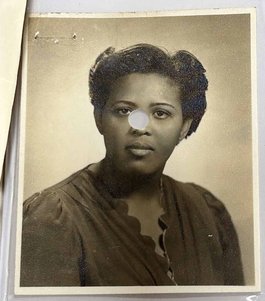
Photograph of Louise Bennett accompanying her scholarship form. Catalogue reference: BW 84/39/17
Louise also wrote a letter to the British Council Scholarships Committee which outlined her previous work:
Within the last four years, I have acted in several successful plays and have written short plays in Jamaican dialect, which have been performed throughout the island. I have also published three books of both prose and poetry written in Jamaican dialect and was an active worker in the literacy campaign.
Creative from a young age, Louise had a significant amount of experience in writing and acting prior to applying to the British Council. Jamaican culture heavily influenced her work, as did her working-class background. Louise emphasised in her letter that she would be unable to continue her studies without the support of the British Council:
It is my earnest desire to help the people of my country through the subjects I propose to study and a British Council Scholarship is my only hope of an opportunity to do so
Louise was subsequently accepted at RADA on the condition that she passed the entrance test, which she did. By the summer of 1945, arrangements were made for her journey to Britain.
Experience at the Royal Academy of Dramatic Art
Louise began her studies in the autumn of 1945. A report written by RADA provides an insight into Louise’s time there. Praised for her intelligence, enthusiasm for learning, and interest in all aspects of the English theatre, Louise seems to have impressed the tutors. Interestingly, the report also notes that ‘she found a friendly reception from our staff and students.’
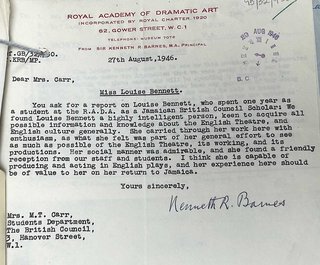
Transcript
27th August, 1946.
Dear Mrs. Carr,
Miss Louise Bennett.
You ask for a report on Louise Bennett, who spent one year as a student at the R.A.D.A. as a Jamaican British Council Scholar: We found Louise Bennett a highly intelligent person, keen to acquire all possible information and knowledge about the English Theatre, and English culture generally. She carried through her work here with enthusiasm, as what she felt was part of her general effort to see as much as possible of the English Theatre, its working, and its productions. Her social manner as admirable, and she found a friendly reception from our staff and students. I think she is capable of producing and acting in English plays, and her experience here should be of value to her on her return to Jamaica.
Yours sincerely,
Kenneth R. Barnes
27th August, 1946.
Dear Mrs. Carr,
Miss Louise Bennett.
You ask for a report on Louise Bennett, who spent one year as a student at the R.A.D.A. as a Jamaican British Council Scholar: We found Louise Bennett a highly intelligent person, keen to acquire all possible information and knowledge about the English Theatre, and English culture generally. She carried through her work here with enthusiasm, as what she felt was part of her general effort to see as much as possible of the English Theatre, its working, and its productions. Her social manner as admirable, and she found a friendly reception from our staff and students. I think she is capable of producing and acting in English plays, and her experience here should be of value to her on her return to Jamaica.
Yours sincerely,
Kenneth R. Barnes
Report from RADA on Louise Bennett, 1946. Catalogue ref: BW 84/39/17
Although these records do not state that Louise experienced racism during her studies, as the first Black student to study at RADA, this would have likely happened. She also would have faced racism in her broader experiences of living in England during the 1940s.
Through her studies at RADA, Louise was able to develop her skill as a performer. The Birmingham Post commented that ‘she learnt the sophisticated technique which has given a second dimension to her natural exuberant ability.’
After her year at RADA, Louise hoped to continue her studies in the Caribbean, most notably spending a period of time in Trinidad. In a letter to the British Council, she wrote that ‘after a very profitable year of studies at the Royal Academy…I have come aware of the fact that the natural end of my course lies in the West Indies’.
She went on to outline her case for continuing her studies in Trinidad:
My idea is, not as others have done before, to encourage my people to accept a form of art totally unsuited to their personalities, but to apply the excellent English methods of culture to the wealth of native material we possess. There is in the West Indies, a large amount of undeveloped art, which, thanks to the Royal Academy, I could make into valuable contributions to the cultural development of my country.
Louise’s comment on the undeveloped art of the West Indies reflects the bias towards Western art and artists, and what is perceived to be ‘undeveloped art’. Although these are Louise’s own words, she would have been expressing views that the British Council wanted to hear as a way of strengthening her case to extend her studies.
The British Council stated they were unable to grant this extension, as the scholarship funding could only be used for studies in Britain.
Despite this, Louise travelled to Trinidad after her year at RADA. Her name is recorded on the Atlantis passenger list which departed from Southampton on 6 September 1946 (catalogue reference: BT 27/1600). Louise’s occupation is recorded as ‘Writer’ and she disembarked at Port of Spain, Trinidad. Her last recorded address was listed as 14 Brunswick Square, London, where she lived during her studies at RADA.
Further correspondence from the British Council suggests there was some confusion over who was funding Louise’s studies in Trinidad. The British Council may have advanced Louise a sum of money which she was required to pay back.
Career
Louise went on to have a varied and successful career in the arts. She hosted two radio programs for the BBC – Caribbean Carnival from 1945 to 1946 and West Indian Night in 1950. She also performed with repertory companies in Coventry, Huddersfield, and Amersham. In 1954, Louise married Eric Winston Coverley (becoming Louise Bennett-Coverley) and they had a son called Fabian.
Louise spent most of her time in Jamaica. She played the leading role in the annual Jamaica pantomime and worked on the show’s script and lyrics. She also featured in numerous films, such as High Wind in Jamaica (1965).
She later became known as Miss Lou, a name inspired by her radio show Miss Lou’s Views, which ran from 1965 to 1982. The Birmingham Post wrote ‘There is not a Jamaican who does not know her name, and very few who have not listened to her reading her poems or playing sketches in the local vernacular on Radio Jamaica.’
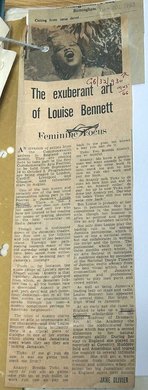
Partial transcript
An invasion of artists from the Commonwealth arrives in England next month. They are coming here to take part in the first Commonwealth Arts Festival to be held from September 16 to October 2. Programmes are being staged in London, Cardiff, Liverpool and Glasgow, and rehearsals start in August.
One of the best known and certainly one of the best loved personalities taking part in the Festival is Jamaica’s Louise Bennett. There is not a Jamaican who does not know her name and very few who have not listened to her reading her poems or plating sketches in the local vernacular on Radio Jamaica.
Though she is undisputed queen of the Jamaican theatre, her first love is the folklore and folk music of her beautiful island. Through her painstaking research many of the old slave-day songs and stories have been saved from extinction and are becoming part of Jamaican literature.
There is, for instance, the whole range of Louise’s special Anancy stories. (Anancy is that legendary Jamaican spider-god from whom, so Jamaican folklore has it, all the human race is descended. Anancy is part god, part devil and part homespun Jamaican – but in all the best stories he unaccountably speaks through his notes – a modern compliment perhaps to American neighbours).
The teller of Anancy stories must be able to impersonate all the characters – and this Louise Bennett does quite brilliantly.
An invasion of artists from the Commonwealth arrives in England next month. They are coming here to take part in the first Commonwealth Arts Festival to be held from September 16 to October 2. Programmes are being staged in London, Cardiff, Liverpool and Glasgow, and rehearsals start in August.
One of the best known and certainly one of the best loved personalities taking part in the Festival is Jamaica’s Louise Bennett. There is not a Jamaican who does not know her name and very few who have not listened to her reading her poems or plating sketches in the local vernacular on Radio Jamaica.
Though she is undisputed queen of the Jamaican theatre, her first love is the folklore and folk music of her beautiful island. Through her painstaking research many of the old slave-day songs and stories have been saved from extinction and are becoming part of Jamaican literature.
There is, for instance, the whole range of Louise’s special Anancy stories. (Anancy is that legendary Jamaican spider-god from whom, so Jamaican folklore has it, all the human race is descended. Anancy is part god, part devil and part homespun Jamaican – but in all the best stories he unaccountably speaks through his notes – a modern compliment perhaps to American neighbours).
The teller of Anancy stories must be able to impersonate all the characters – and this Louise Bennett does quite brilliantly.
Newspaper clipping from the Birmingham Post, 8 July 1965. Catalogue ref: BW 84/39/17
Jamaica's culture and dialect were woven into Louise’s artistic craft. She wrote numerous books and poetry in Jamaican Patois, a language which has become symbolic of Jamaica’s vibrant culture. It is spoken primarily in Jamaica and the Jamaican diaspora. Indeed, Louise was influential in championing Jamaican Patois as an artistic medium.
Her work highlighted themes of identity, migration, and colonialism, which are captured in her poem Colonization in Reverse. A shortened version has been featured in Transport for London’s ‘Poems on the Underground’ series.
Jamaican folklore also played an important part in Louise’s work, and she went on to teach folklore and drama at the University of the West Indies.
A ‘leading lady on stage and radio’, Louise’s multifaceted career in the arts had a significant impact on Jamaican culture. Praised and respected by audiences in both Jamaica and abroad, the legacy of her work can still be seen today.
Records featured in this article
-
- Title
- British Council Scholarships
- Date
- 1945–1946
-
- Title
- Outwards passenger lists for Southampton
- Date
- 1946
